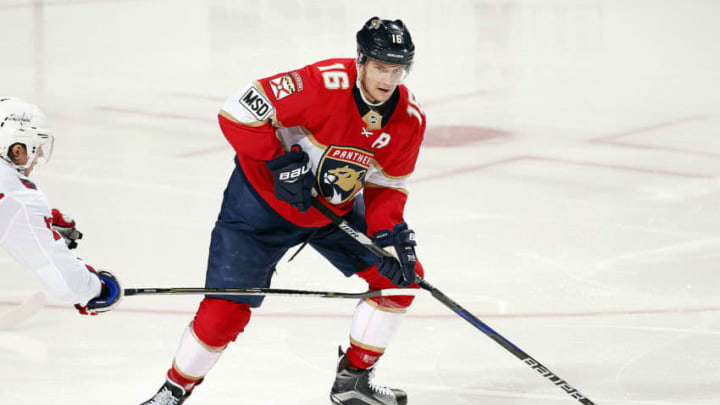Florida Panthers: How Aleksander Barkov has revitalized the future of the Cats

In January 2016, the Florida Panthers announced the re-signing of center Aleksander Barkov to a six-year extension. While the early years of his career was filled with injuries and shortened seasons, Barkov has become what was expected: a top center pushing the Panthers’ to a playoff position.
Tampa Bay Lightning director of amateur scouting Al Murray had this to say about Barkov’s arsenal of skills when asked back in 2013:
"“He’s a combination of a goal-scorer and a playmaker. He played the past two years in the Finnish Elite League and this past year was very impressive. He was top 10 in scoring in the men’s league as a 17-year-old.”"
In just two seasons with Tappara’s senior team, Aleksander Barkov saw 85 games of action, scoring 28 goals and assisting on another 36 goals.
In his final season with Tappara, Barkov finished with 48 points in 53 games, ranking 9th in Liiga scoring. His talents led Tappara to a runners-up finish.
However, his NHL career has been seldom at points. While Barkov has shown flashes of being a top 10 center, he’s battled injuries and has missed multiple games in the past two full seasons.
In 2014, Barkov suffered a knee injury while on international duty with Finland for the Winter Olympics. The injury forced Barkov, who had 24 points in 54 games before the injury, to miss the rest of that season.
In 2015 and 2016, Aleksander missed 37 total games or 22% of games to various injuries. Last year in particular, his injury was a large reason as to why the Panthers were never able to get anything going.
Despite the injury concerns, however, Barkov has been a consistent top line center and even a potential Selke Candidate each and every year, which would include this season.
More from Editorials
- Best Panthers prop bets for Stanley Cup Final Game 3
- Best Panthers NHL prop bets for Stanley Cup Final Game 2
- Panthers prop bets for Stanley Cup Final Game 1
- Panthers Get An Early Christmas Present From NHL
- Panthers vs. Flyers: Players to watch closely
Since the beginning of the 2015-16 season, Barkov has averaged close to a point a game, including 59 points in 66 games, which put him on pace for 73 points had his season not ended early.
This season, in particular, Aleksander is on pace for 79 points in 81 games (missed a game through injury), which would be a career high throughout his professional career.
His contributions, however, go past the point total and extend all the way to both sides of the power play.
He is one of the main reasons the Florida Panthers, who struggled in shorthanded situations throughout the early part of the season, have the 4th ranked penalty kill since the start of December. Barkov, who has played with Vincent Trocheck primarily on the penalty kill, has 5 shorthanded goals.
On the man advantage, Barkov has 7 primary points and 11 points total. Aleksander also has a 88.3% Corsi For (CF%), which ranks 2nd on the team behind Jamie McGinn, who has played significantly less minutes than Barkov on the power play (195 minutes compared to 74).
In 5v5 situations, Barkov is 2nd on the team for CF% at 52.58%. In the same 5v5 situation, Barkov scores 2.03 points per 60 minutes, which also ranks 3rd on the team, sitting behind Evgeni Dadonov and Jonathan Huberdeau, both who have played the majority of the season with Barkov on the first line. Ranking 4th on that list is Nick Bjugstad (1.81), who is currently Barkov’s line mate.
With his current stats and current pace, it’s surprising that the Panthers were able to extend Aleksander Barkov in 2016 for just a $5.9 million cap hit per year until the end of the 2021-22 season.
Next: Looking at the Florida Panthers' Playoff Chase
The contract puts Barkov in similar territory as Dustin Brown ($5.9m cap hit), Brandon Dubinsky ($5.85m), Jordan Staal ($6m cap hit) and teammate Jonathan Huberdeau, who has the same cap hit at $5.9m.